Texture Talk: Meet the Photography Duo Helping Black Youth Love the Skin They’re In
One of the things you’re likely to spot the minute you step into my daughter’s nursery is a wee shelf populated with picture books that showcase Black faces as main characters. Books whose dark-skinned heroes not only visually resemble who my daughter is in this world but whose stories showcase Black youth in an uplifting and positive light rather than through the damaging stereotypical views that society — to this day — all too often uses to describe us: uneducated, living in poverty, angry, dangerous, oversexualized. The list unfortunately goes on.
Representation matters. When I was a kid, my childhood reading and TV and movie watching were often about worlds of mostly blue-eyed, blond-haired children who looked nothing like me. I truthfully can’t recall a powerful, strong Black role model that I could look up to in my youth.
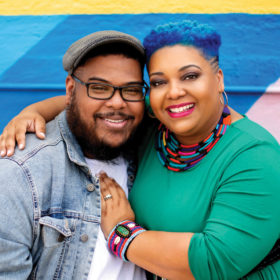
This left me wanting to play only with my white Barbies, and for years I had a deep yearning to conform to a portrait of popular beauty designed by a Eurocentric society. It wasn’t until I was in my 20s that I truly began to take pride in my own natural looks. Let’s just say that I refuse to have my daughter live and think that way. I want her to always be proud of who she is, from her voluminous coils and chocolate skin to her Ghanaian-Caribbean background.
So, when I discovered the coffee-table book Glory: Magical Visions of Black Beauty by Kahran and Regis Bethencourt, the wife-and-husband photography duo behind Atlanta-based CreativeSoul Photography, I purchased it immediately. (Fun fact: Their work has earned them global recognition over the years and many viral call-outs from A-listers like Alicia Keys, Common and Taraji P. Henson.)
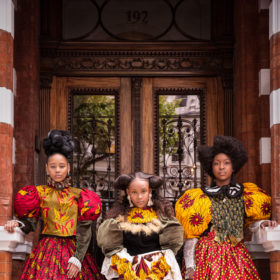
Inside the 256-page tome you’ll find a next-level collection of Kahran and Regis’s niche work: one-of-a-kind photographs of real-life Black youth (who are between five and 13 years old and hail from across the United States and countries in Africa) looking like true monarchs and flexing a whole range of natural hairstyles — not to mention they’re serving major fashion looks by Black designers. From cornrows adorned with colourful cowrie shells to asymmetrical afros to sculptural braids and twist-outs, afro-textured hair — and Black skin tones of every hue, for that matter — becomes a symbol of empowerment, beauty, self-care and individuality. “We really tried to showcase all types of natural hair, from 4C coils to looser textures, because there is still this sense of what is considered ‘good hair’ and what’s not within Black communities,” explains Kahran.
The book, I later discovered, was released in 2020 — a time when the world was not only grappling with a health pandemic but also finally facing a harsh light on anti-Black racism in many areas of society. To my mind, Kahran and Regis’s timing couldn’t have been better.
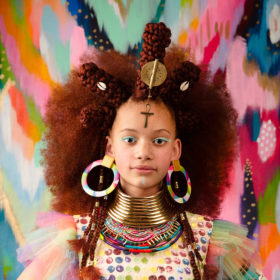
What makes Kahran and Regis’s dreamy imagery even more special as you flip through the pages is that alongside powerful quotes by famous figures — Nelson Mandela, Maya Angelou, Oprah Winfrey, Muhammad Ali — the duo provide space for the Black youth they feature to share their own stories and explore their dreams. Think an eight-year-old neuroscience expert who’s able to dissect mind-boggling topics, a 13-year-old with a clothing line aimed at combatting racism and colourism, young kids fighting discriminatory hair policies in schools that forbid certain Black hairstyles and children celebrating life despite health problems and disabilities.
“When we first started photographing kids, we focused more on showing the beauty and uniqueness of afro hair,” shares Kahran. “But we soon realized that these kids had amazing stories and were doing inspiring things. Sadly, that’s not what’s being highlighted or shown in the media, so we felt like we had an opportunity to give these kids a platform and share their voices with the world. That’s really how the idea for Glory came about. We wanted to extend the narrative to much more than just hair.”
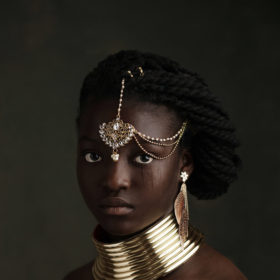
The post-shoot reactions are heart-melting. “The kids are usually amazed to see themselves photographed in that way,” says Kahran. “The transformation isn’t just from the outside; it’s from the inside as well: Their chests stick out a little bit more, and they hold their heads higher.” Adds Regis: “And they continue to carry that confidence with them.”
And don’t be mistaken: CreativeSoul’s work is just as much for adults as it is for children, serving as an educational tool for all — even those living outside Black culture. Kahran says that when they share their images on social media, they often receive comments of awe and curiosity from unknowing minds. “We use our platform to educate as well as entertain,” she states.
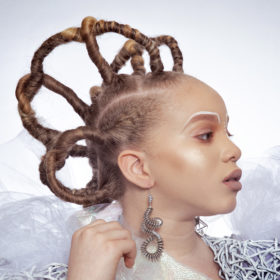
In fact, Glory doesn’t live on my daughter’s bookshelf. No, no. It sits on display in our living room for all visitors to see, touch and learn from.
I truly can’t wait to regularly absorb those magnificent pages with my daughter as I watch her grow into her own person, reading her stories of young Black kids just like her doing incredible things and winning at life — stories for her to idolize and daydream about. It would bring me so much joy to see those page corners well worn.
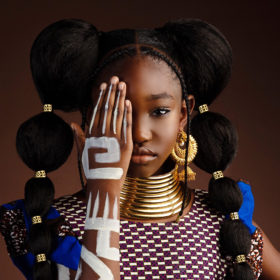
And good news! Another coffee-table book is on its way, due to arrive in summer 2023, shares Kahran. “It will be called Crowned, and it will be a book of Black fairy tales,” she says. “Some are our own takes on existing fairy tales and African and African-American folklore stories, and others are ones we came up with. We’re super excited for it to be out in the world.” Excuse me: adding my name to the pre-order list ASAP.
This article first appeared in FASHION’s September issue. Find out more here.
The post Texture Talk: Meet the Photography Duo Helping Black Youth Love the Skin They’re In appeared first on FASHION Magazine.